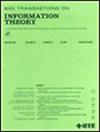Private Noisy Side Information Helps to Increase the Capacity of SPIR
IF 2.2
3区 计算机科学
Q3 COMPUTER SCIENCE, INFORMATION SYSTEMS
引用次数: 0
Abstract
Noiseless private side information does not reduce the download cost in Symmetric Private Information Retrieval (SPIR) unless the client knows all but one file. While this is a pessimistic result, we explore in this paper whether noisy client side information available at the client helps decrease the download cost in the context of SPIR with colluding and replicated servers. Specifically, we assume that the client possesses noisy side information about each stored file, which is obtained by passing each file through one of D possible discrete memoryless test channels. The statistics of the test channels are known by the client and by all the servers, but the mapping求助全文
约1分钟内获得全文
求助全文
来源期刊

IEEE Transactions on Information Theory
工程技术-工程:电子与电气
CiteScore
5.70
自引率
20.00%
发文量
514
审稿时长
12 months
期刊介绍:
The IEEE Transactions on Information Theory is a journal that publishes theoretical and experimental papers concerned with the transmission, processing, and utilization of information. The boundaries of acceptable subject matter are intentionally not sharply delimited. Rather, it is hoped that as the focus of research activity changes, a flexible policy will permit this Transactions to follow suit. Current appropriate topics are best reflected by recent Tables of Contents; they are summarized in the titles of editorial areas that appear on the inside front cover.
 求助内容:
求助内容: 应助结果提醒方式:
应助结果提醒方式:


